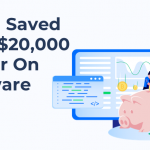Designers, Developers, Entrepreneurs, and Clients, Lend Me Your Ears!
(Aka. The Video Transcript)
Hi. This is Jason Long with BrainLeaf. Today, I want to talk to you about the top issues facing the industry of web and app development. I’ve narrowed it down to five different things. I’ve got a lot of cue cards for this particular lesson. One, people don’t scope their work. Two, they aren’t using the right tools. Three, companies don’t have the resources, companies and freelancers don’t have the resources to actually get their work done. Four, they don’t manage their clients expectations properly. Five, they don’t charge enough for the work. These are by far easily, in my opinion, the top things that face this industry and frankly, plague this industry. Today, I’m going to do a little bit longer video to talk about these things.

1. No Scope of Work
The first thing, people don’t scope their work. This is simple. When you’re building a project, I’ve done a video about this before, when you’re scoping a project or you’re building a project, in the same way as building a house, you have to have a blueprint. You have to know what you’re building before you build it. So often, people just take a picture of the front of the house which is like a brief description of the project and say, “We’re going to build this”, with no real understanding of what’s going into that project. It’s so important whether you’re an agency owner, a freelancer, or client or entrepreneur, that you make sure that whoever is doing your project for you has a scope of work document that lays out the ins and out of how things are being done and exactly how much time is going to go in to each one of these phases. There’s a lot of different ways to do this. Obviously, BrainLeaf is one of those ways. If you don’t have that as a part of your project, it could turn out very badly for you.

2. Not Enough, or The Wrong Resources
The next thing is, so often companies don’t have the resources to do the work. What this means is not necessarily that they’re understaffed, but being a developer, it’s kind of like you can equate it to being a doctor. If you’re a cardiologist, you’re probably not going to be doing brain surgery. If you’re a brain surgeon, you don’t want your brain surgeon working on your heart. It’s the same thing with development. You don’t want someone who only specializes in front end coding to be working on your back end projects. Very often, I see this with agencies that are understaffed or we see it with entrepreneurs trying to get things done, that they’ve hired a developer but they don’t know what goes into the project and they don’t understand the different aspects of that. They have a front end person when really they need a back end person or vice versa, or very often they need both and they need maybe a database specialist as well, but at the end of the day, they just have one person doing it. I see that as a problem fairly regularly.

3. The Wrong Tools… Mostly In Project Management
My next one is, they aren’t using the right tools. Really what I see as far as the right tools go, designers are generally using design tools. Developers are generally using development tools. The problem though is in project management tools more often than not. They’re out there building things, but people sometimes are using Basecamp as a project management tool when they really need something that’s closer to Jira or I don’t know, some other true project management tool. That’s the number one area where I see the tools not being correct.

4. Expectation Management
Next, we’ve got people who don’t manage clients expectations properly. This very much comes back to the whole scoping issue. If you haven’t scoped a project and you don’t know how much time is going into it, you don’t really know what you’re doing, you don’t have a clear picture of what’s going into this project. You’re not going to be able to manage your client’s expectations properly. On top of that, more than likely you’re going to be guessing at how long things are going to take, and you’ll be guessing at how much it’s going to cost you, so you’re going to be guessing at how much money you’re going to make or lose on this project. I can’t tell you how many times I’ve seen that. Honestly, I’ve been a part of that a few times as well and that’s so frustrating. That’s that.

5. People Don’t Charge Enough For Their Work
Finally, they don’t charge enough for the work. I see this with new entrepreneurs, agency owners and freelancers all the time. So often they’re going to charge a flat fee amount on a project and they’re going to work and work and work and work and work and work and work themselves to death having not, once again, scoped the work or understood what goes into it, and then they’re going to end up making nothing on the project. I’ve run analyses for freelancers and other agencies before and when you end up taking a look at a project, you realize that you made maybe five dollars an hour working on this. When you’re charging a flat fee, you have to know what goes into it. Once again, this comes back to scoping, but it’s also part of pricing. Freelancers, agencies, entrepreneurs in different areas as well so often under price themselves and it just crushes them.
Don’t Let These Things Destroy Your Project!
These are my top five things. I hope this was helpful to you both if you’re a entrepreneur, an agency owner, a freelancer or someone looking to have an app or website built or software built. These are the issues you’ve got to look out for, issues you’ve got to fix. I hope this was helpful to you. This is Jason Long with BrainLeaf and Coderight, have a great day.
Thanks for listening!





